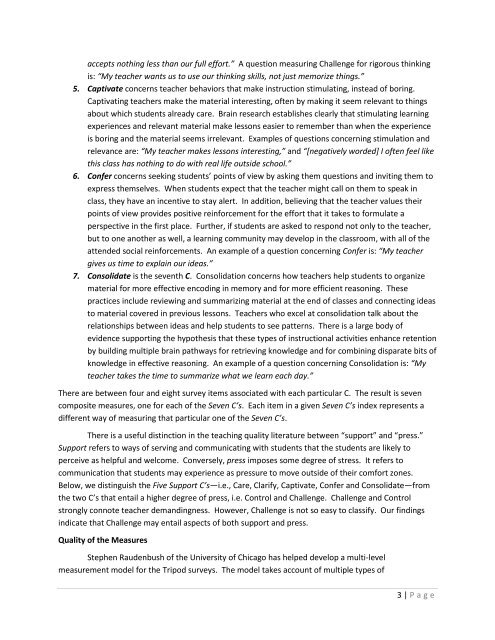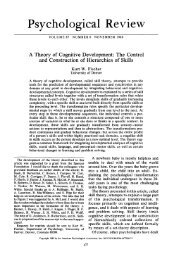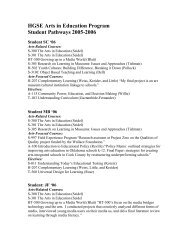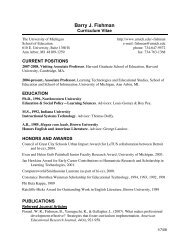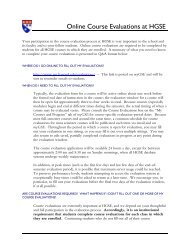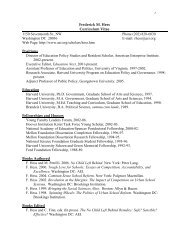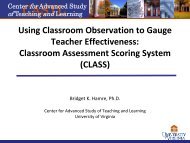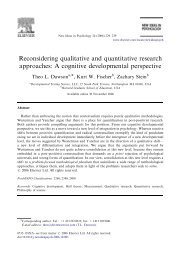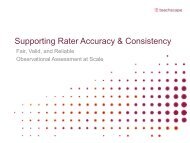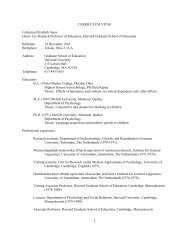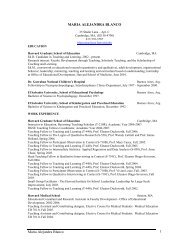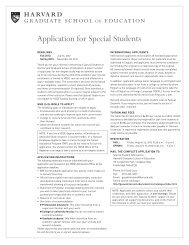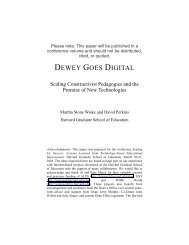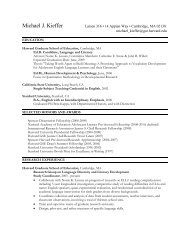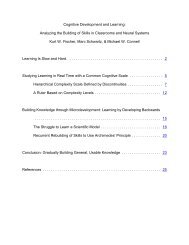Student Perceptions of Teaching Effectiveness - Harvard Graduate ...
Student Perceptions of Teaching Effectiveness - Harvard Graduate ...
Student Perceptions of Teaching Effectiveness - Harvard Graduate ...
Create successful ePaper yourself
Turn your PDF publications into a flip-book with our unique Google optimized e-Paper software.
accepts nothing less than our full effort.” A question measuring Challenge for rigorous thinking<br />
is: “My teacher wants us to use our thinking skills, not just memorize things.”<br />
5. Captivate concerns teacher behaviors that make instruction stimulating, instead <strong>of</strong> boring.<br />
Captivating teachers make the material interesting, <strong>of</strong>ten by making it seem relevant to things<br />
about which students already care. Brain research establishes clearly that stimulating learning<br />
experiences and relevant material make lessons easier to remember than when the experience<br />
is boring and the material seems irrelevant. Examples <strong>of</strong> questions concerning stimulation and<br />
relevance are: “My teacher makes lessons interesting,” and “[negatively worded] I <strong>of</strong>ten feel like<br />
this class has nothing to do with real life outside school.”<br />
6. Confer concerns seeking students’ points <strong>of</strong> view by asking them questions and inviting them to<br />
express themselves. When students expect that the teacher might call on them to speak in<br />
class, they have an incentive to stay alert. In addition, believing that the teacher values their<br />
points <strong>of</strong> view provides positive reinforcement for the effort that it takes to formulate a<br />
perspective in the first place. Further, if students are asked to respond not only to the teacher,<br />
but to one another as well, a learning community may develop in the classroom, with all <strong>of</strong> the<br />
attended social reinforcements. An example <strong>of</strong> a question concerning Confer is: “My teacher<br />
gives us time to explain our ideas.”<br />
7. Consolidate is the seventh C. Consolidation concerns how teachers help students to organize<br />
material for more effective encoding in memory and for more efficient reasoning. These<br />
practices include reviewing and summarizing material at the end <strong>of</strong> classes and connecting ideas<br />
to material covered in previous lessons. Teachers who excel at consolidation talk about the<br />
relationships between ideas and help students to see patterns. There is a large body <strong>of</strong><br />
evidence supporting the hypothesis that these types <strong>of</strong> instructional activities enhance retention<br />
by building multiple brain pathways for retrieving knowledge and for combining disparate bits <strong>of</strong><br />
knowledge in effective reasoning. An example <strong>of</strong> a question concerning Consolidation is: “My<br />
teacher takes the time to summarize what we learn each day.”<br />
There are between four and eight survey items associated with each particular C. The result is seven<br />
composite measures, one for each <strong>of</strong> the Seven C’s. Each item in a given Seven C’s index represents a<br />
different way <strong>of</strong> measuring that particular one <strong>of</strong> the Seven C’s.<br />
There is a useful distinction in the teaching quality literature between “support” and “press.”<br />
Support refers to ways <strong>of</strong> serving and communicating with students that the students are likely to<br />
perceive as helpful and welcome. Conversely, press imposes some degree <strong>of</strong> stress. It refers to<br />
communication that students may experience as pressure to move outside <strong>of</strong> their comfort zones.<br />
Below, we distinguish the Five Support C’s—i.e., Care, Clarify, Captivate, Confer and Consolidate—from<br />
the two C’s that entail a higher degree <strong>of</strong> press, i.e. Control and Challenge. Challenge and Control<br />
strongly connote teacher demandingness. However, Challenge is not so easy to classify. Our findings<br />
indicate that Challenge may entail aspects <strong>of</strong> both support and press.<br />
Quality <strong>of</strong> the Measures<br />
Stephen Raudenbush <strong>of</strong> the University <strong>of</strong> Chicago has helped develop a multi-level<br />
measurement model for the Tripod surveys. The model takes account <strong>of</strong> multiple types <strong>of</strong><br />
3 | P a g e


